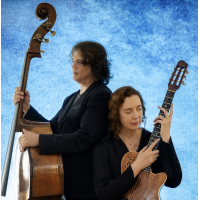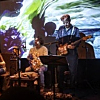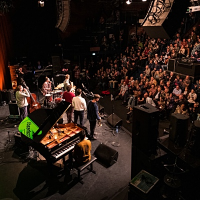Home » Jazz Articles » Robert Sabin
Jazz Articles about Robert Sabin
John Yao: Points In Time

by Angelo Leonardi
Attivo sulla scena di New York da vent'anni, John Yao s'è distinto come docente (al Berklee College e al Queens College), trombonista di sezione in big band (Vanguard Jazz Orchestra, Afro-Latin Jazz Orchestra) e solista in altri organici ( Paquito D'Rivera, Eddie Palmieri, Danilo Perez, </a>Chris Potter) oltre che leader di propri gruppi, con cui ha inciso sei album. Uno di questi (Flip Flop, 2015) ha visto il suo debutto come caporchestra, attività che gli ha procurato i riconoscimenti del ...
Continue ReadingJohn Yao and His 17 Piece Instrument: Points In Time

by Jack Bowers
The insuperable spirit of swinging big-band jazz is everywhere apparent on Points in Time, the seventh recording by New York-based composer, arranger and trombonist John Yao, and the second with his marvelous 17-Piece Instrument, a decade after its well-received debut, Flip-Flop. (See Tao, 2015). As on that earlier album, the playlist consists of seven of Yao's original compositions (and one outlier) written with the band in mind to exemplify in musical terms experiences and emotions Yao has ...
Continue ReadingJohn Yao and his 17 Piece Instrument: Points In Time

by Pierre Giroux
Trombonist and composer John Yao presents a heartfelt and personal retrospective with Points In Time. This ambitious album delves deeply into the emotional and professional journey he has undertaken over the past twenty years in New York City. Leading his precisely coordinated ensemble, aptly called His 17-Piece Instrument, comprised of talented musicians from various points along Yao's timeline. The eight original compositions in this session stem from key moments in Yao's life and artistic development. This work is not just ...
Continue ReadingJohn Yao: Off-Kilter

by Mark Corroto
In all great ensemble recordings one pays no attention to the compositions and arrangements. The music just seems to dance without inhibitions and flow over the ears. Correction: excellent ensemble performances compel one to recognize and appreciate the compositions and arrangements. With composer, arranger, trombonist John Yao both statements are true and both are in opposition to each other. Proof being Off-Kilter, the second release by his Triceratops ensemble. It follows How We Do (See Tao Recordings, 2019) and includes ...
Continue ReadingRobert Sabin: Humanity Part II
.jpg)
by Jack Bowers
Although Humanity Part II, the oracular title of bassist Robert Sabin's new album, may summon images of a Mel Brooks parody (Part I must have slipped past us), the music itself is decidedly serious. In the liner notes, wherein he references Albert Camus, Ennio Morricone, John Carpenter, Ingmar Bergman, Maurice Ravel and Dario Argento, Sabin makes it quite clear that he and his tentet are scanning a road map that traverses musical pathways visibly (and audibly) removed from customary ports ...
Continue ReadingRobert Sabin: Humanity Part II
.jpg)
by Troy Collins
Robert Sabin has a dark side. Although the New York-based bassist regularly serves as a sideman to such luminaries as Oliver Lake and Luis Bonilla, Sabin has revealed an abiding fascination with horror throughout his career, as documented on his 2005 Ranula Music debut Killdozer, based on Marvin Heemeyer's infamous armored bulldozer rampage in Colorado the previous year, and his 2007 sophomore follow-up Romero, an ode to George Romero's apocalyptic zombie films. Humanity Part II continues Sabin's investigation ...
Continue Reading"Killer" Ray Appleton: Naptown Legacy

by AAJ Italy Staff
Quanti batteristi vorrebbero un'adolescenza come quella di “Killer" Ray Appleton? Nato a Indianapolis nel 1941, ha iniziato a suonare le percussioni a nove anni, formandosi in quella fervida scena musicale accanto a Freddie Hubbard, James Spaulding, Melvin Rhyne, Larry Ridley e altri protagonisti dell'hard-bop anni cinquanta. In quel periodo Indianapolis era uno dei centri propulsivi del jazz moderno: da lì sono venuti Wes e Buddy Montgomery, J.J. Johnson, Slide Hampton, Pookie Johnson e molti altri strumentisti, che hanno contribuito a ...
Continue Reading
.jpg)
















